第17讲 九年级 Units3--4 【名师导航】人教版2025中考英语一轮复习综合素养分层演练(含答案解析)
文档属性
| 名称 | 第17讲 九年级 Units3--4 【名师导航】人教版2025中考英语一轮复习综合素养分层演练(含答案解析) | 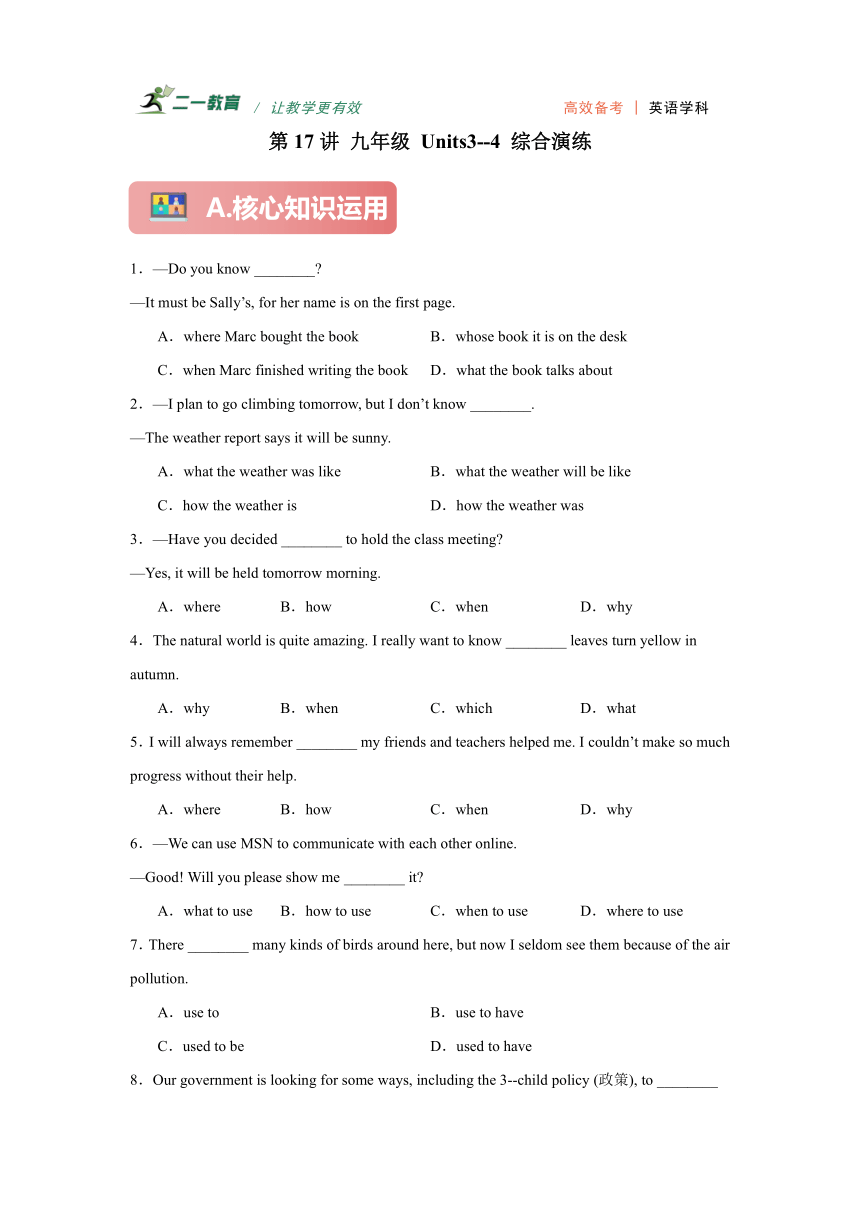 | |
| 格式 | docx | ||
| 文件大小 | 345.3KB | ||
| 资源类型 | 试卷 | ||
| 版本资源 | 人教新目标(Go for it)版 | ||
| 科目 | 英语 | ||
| 更新时间 | 2025-03-25 11:16:13 | ||
图片预览

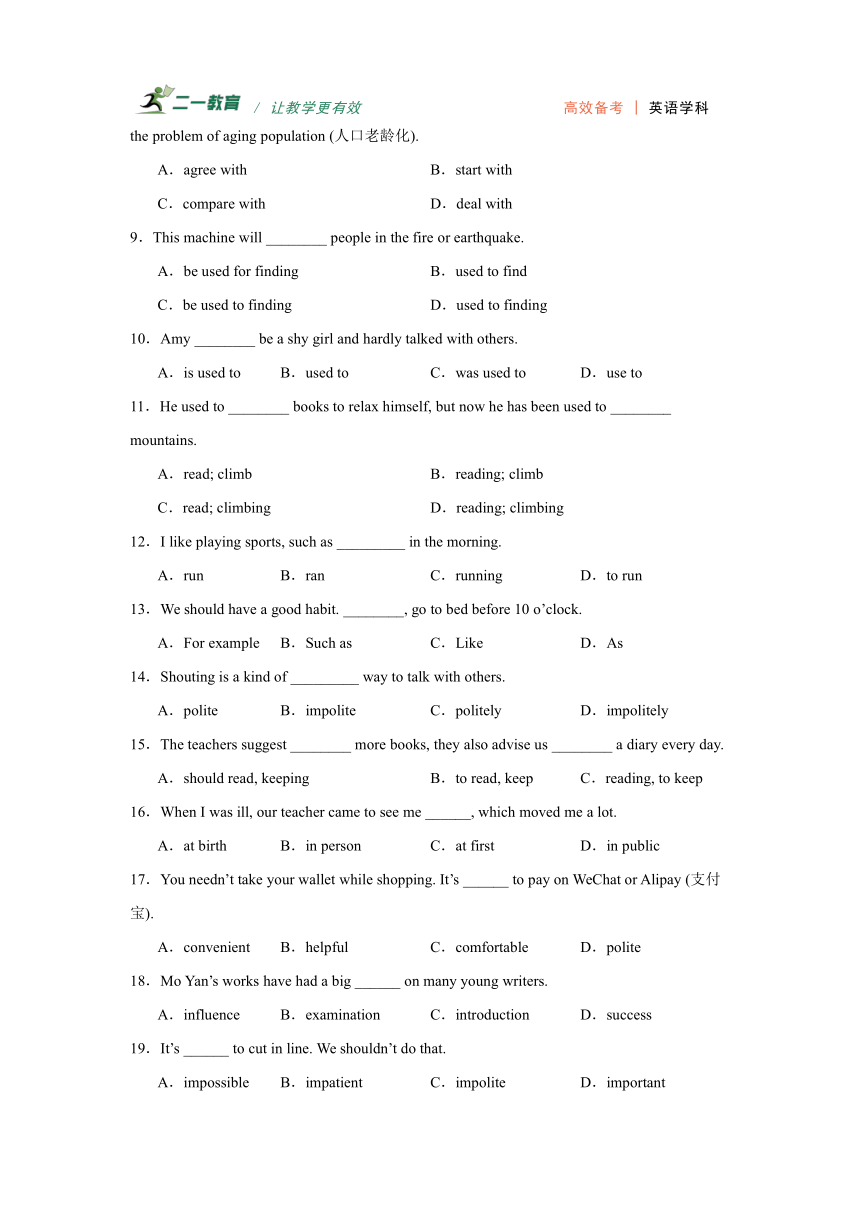
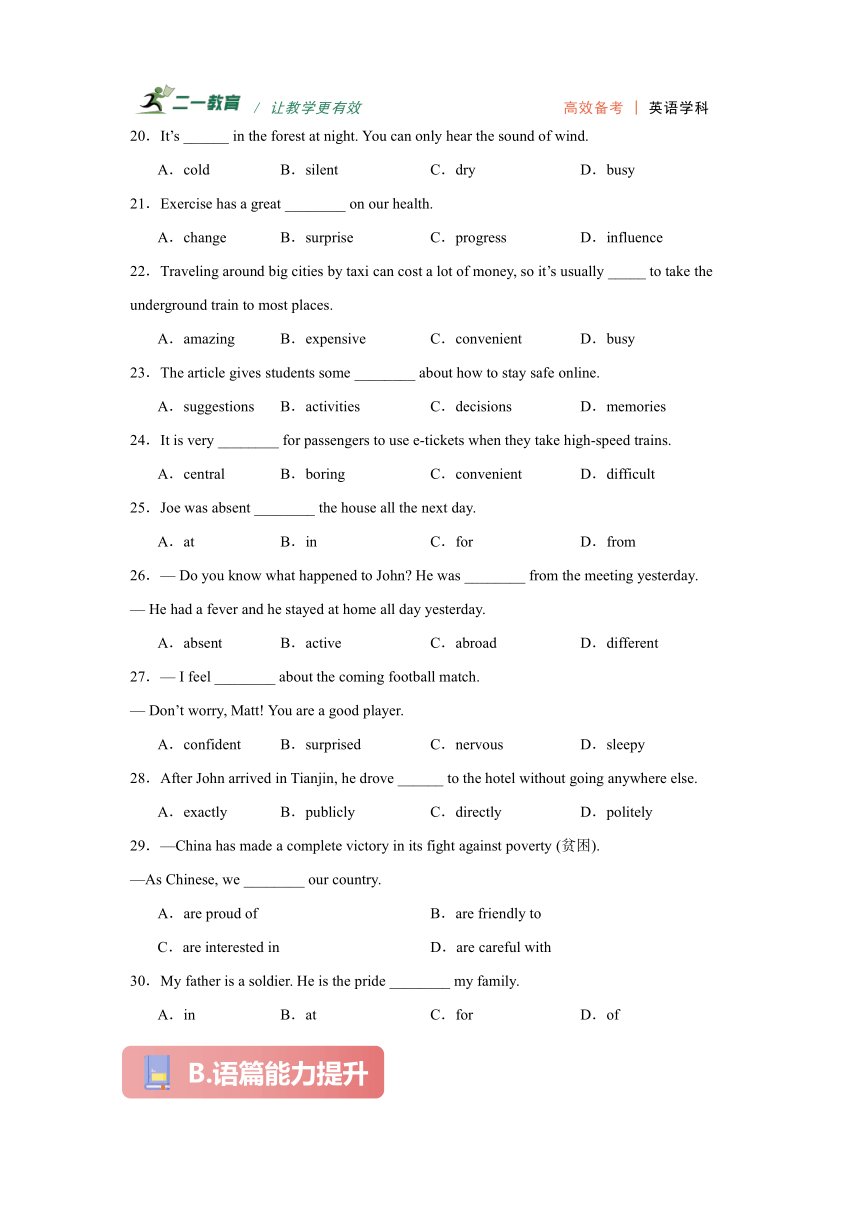
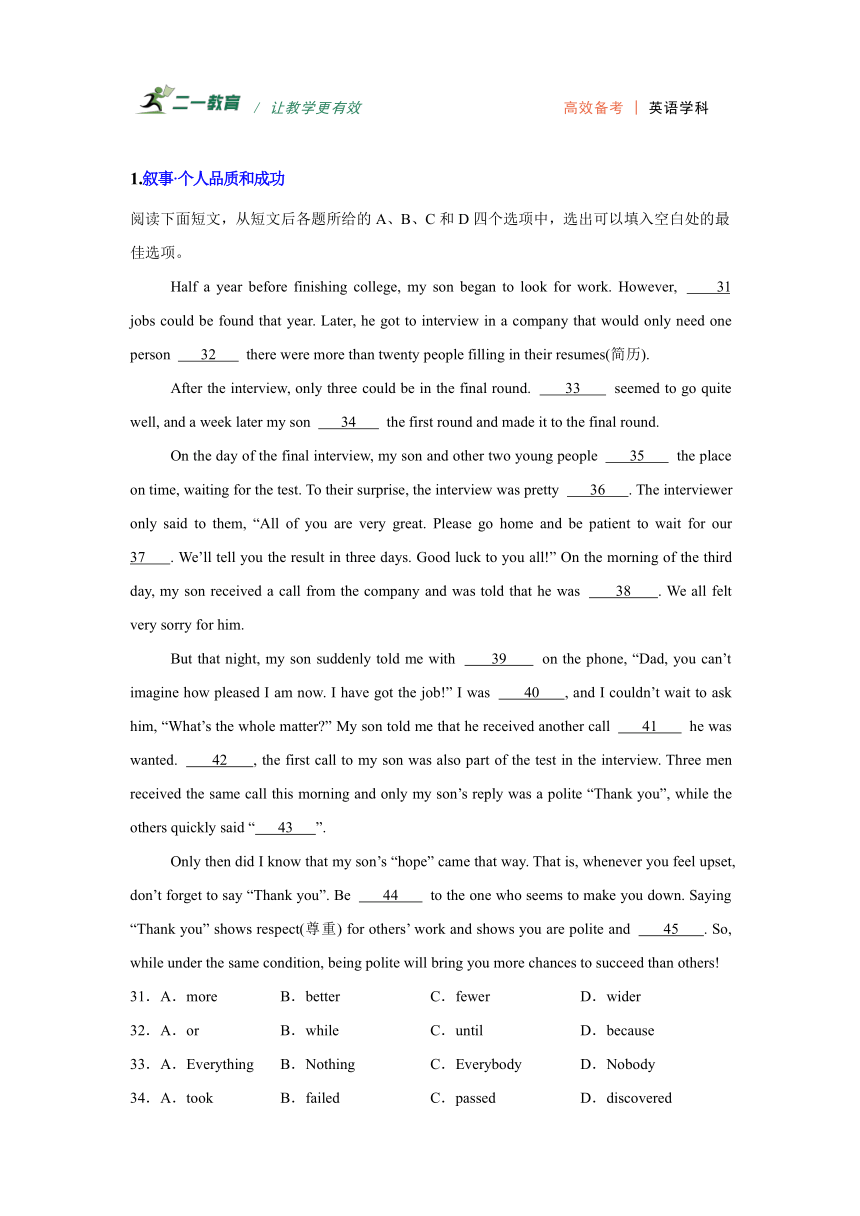
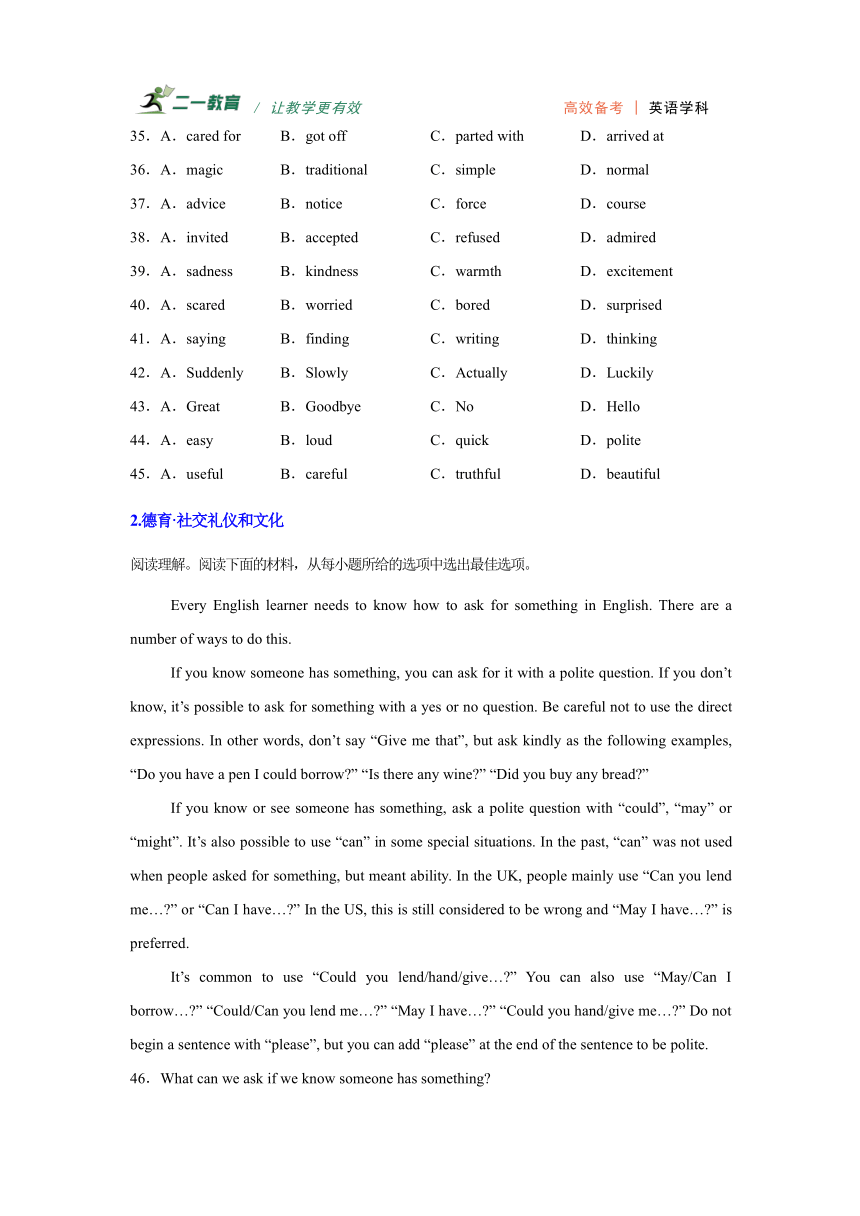
文档简介
/ 让教学更有效 高效备考 | 英语学科
第17讲 九年级 Units3--4 综合演练
1.—Do you know ________
—It must be Sally’s, for her name is on the first page.
A.where Marc bought the book B.whose book it is on the desk
C.when Marc finished writing the book D.what the book talks about
2.—I plan to go climbing tomorrow, but I don’t know ________.
—The weather report says it will be sunny.
A.what the weather was like B.what the weather will be like
C.how the weather is D.how the weather was
3.—Have you decided ________ to hold the class meeting
—Yes, it will be held tomorrow morning.
A.where B.how C.when D.why
4.The natural world is quite amazing. I really want to know ________ leaves turn yellow in autumn.
A.why B.when C.which D.what
5.I will always remember ________ my friends and teachers helped me. I couldn’t make so much progress without their help.
A.where B.how C.when D.why
6.—We can use MSN to communicate with each other online.
—Good! Will you please show me ________ it
A.what to use B.how to use C.when to use D.where to use
7.There ________ many kinds of birds around here, but now I seldom see them because of the air pollution.
A.use to B.use to have
C.used to be D.used to have
8.Our government is looking for some ways, including the 3- child policy (政策), to ________ the problem of aging population (人口老龄化).
A.agree with B.start with
C.compare with D.deal with
9.This machine will ________ people in the fire or earthquake.
A.be used for finding B.used to find
C.be used to finding D.used to finding
10.Amy ________ be a shy girl and hardly talked with others.
A.is used to B.used to C.was used to D.use to
11.He used to ________ books to relax himself, but now he has been used to ________ mountains.
A.read; climb B.reading; climb
C.read; climbing D.reading; climbing
12.I like playing sports, such as _________ in the morning.
A.run B.ran C.running D.to run
13.We should have a good habit. ________, go to bed before 10 o’clock.
A.For example B.Such as C.Like D.As
14.Shouting is a kind of _________ way to talk with others.
A.polite B.impolite C.politely D.impolitely
15.The teachers suggest ________ more books, they also advise us ________ a diary every day.
A.should read, keeping B.to read, keep C.reading, to keep
16.When I was ill, our teacher came to see me ______, which moved me a lot.
A.at birth B.in person C.at first D.in public
17.You needn’t take your wallet while shopping. It’s ______ to pay on WeChat or Alipay (支付宝).
A.convenient B.helpful C.comfortable D.polite
18.Mo Yan’s works have had a big ______ on many young writers.
A.influence B.examination C.introduction D.success
19.It’s ______ to cut in line. We shouldn’t do that.
A.impossible B.impatient C.impolite D.important
20.It’s ______ in the forest at night. You can only hear the sound of wind.
A.cold B.silent C.dry D.busy
21.Exercise has a great ________ on our health.
A.change B.surprise C.progress D.influence
22.Traveling around big cities by taxi can cost a lot of money, so it’s usually _____ to take the underground train to most places.
A.amazing B.expensive C.convenient D.busy
23.The article gives students some ________ about how to stay safe online.
A.suggestions B.activities C.decisions D.memories
24.It is very ________ for passengers to use e-tickets when they take high-speed trains.
A.central B.boring C.convenient D.difficult
25.Joe was absent ________ the house all the next day.
A.at B.in C.for D.from
26.— Do you know what happened to John He was ________ from the meeting yesterday.
— He had a fever and he stayed at home all day yesterday.
A.absent B.active C.abroad D.different
27.— I feel ________ about the coming football match.
— Don’t worry, Matt! You are a good player.
A.confident B.surprised C.nervous D.sleepy
28.After John arrived in Tianjin, he drove ______ to the hotel without going anywhere else.
A.exactly B.publicly C.directly D.politely
29.—China has made a complete victory in its fight against poverty (贫困).
—As Chinese, we ________ our country.
A.are proud of B.are friendly to
C.are interested in D.are careful with
30.My father is a soldier. He is the pride ________ my family.
A.in B.at C.for D.of
1.叙事·个人品质和成功
阅读下面短文,从短文后各题所给的A、B、C和D四个选项中,选出可以填入空白处的最佳选项。
Half a year before finishing college, my son began to look for work. However, 31 jobs could be found that year. Later, he got to interview in a company that would only need one person 32 there were more than twenty people filling in their resumes(简历).
After the interview, only three could be in the final round. 33 seemed to go quite well, and a week later my son 34 the first round and made it to the final round.
On the day of the final interview, my son and other two young people 35 the place on time, waiting for the test. To their surprise, the interview was pretty 36 . The interviewer only said to them, “All of you are very great. Please go home and be patient to wait for our 37 . We’ll tell you the result in three days. Good luck to you all!” On the morning of the third day, my son received a call from the company and was told that he was 38 . We all felt very sorry for him.
But that night, my son suddenly told me with 39 on the phone, “Dad, you can’t imagine how pleased I am now. I have got the job!” I was 40 , and I couldn’t wait to ask him, “What’s the whole matter ” My son told me that he received another call 41 he was wanted. 42 , the first call to my son was also part of the test in the interview. Three men received the same call this morning and only my son’s reply was a polite “Thank you”, while the others quickly said “ 43 ”.
Only then did I know that my son’s “hope” came that way. That is, whenever you feel upset, don’t forget to say “Thank you”. Be 44 to the one who seems to make you down. Saying “Thank you” shows respect(尊重) for others’ work and shows you are polite and 45 . So, while under the same condition, being polite will bring you more chances to succeed than others!
31.A.more B.better C.fewer D.wider
32.A.or B.while C.until D.because
33.A.Everything B.Nothing C.Everybody D.Nobody
34.A.took B.failed C.passed D.discovered
35.A.cared for B.got off C.parted with D.arrived at
36.A.magic B.traditional C.simple D.normal
37.A.advice B.notice C.force D.course
38.A.invited B.accepted C.refused D.admired
39.A.sadness B.kindness C.warmth D.excitement
40.A.scared B.worried C.bored D.surprised
41.A.saying B.finding C.writing D.thinking
42.A.Suddenly B.Slowly C.Actually D.Luckily
43.A.Great B.Goodbye C.No D.Hello
44.A.easy B.loud C.quick D.polite
45.A.useful B.careful C.truthful D.beautiful
2.德育·社交礼仪和文化
阅读理解。阅读下面的材料,从每小题所给的选项中选出最佳选项。
Every English learner needs to know how to ask for something in English. There are a number of ways to do this.
If you know someone has something, you can ask for it with a polite question. If you don’t know, it’s possible to ask for something with a yes or no question. Be careful not to use the direct expressions. In other words, don’t say “Give me that”, but ask kindly as the following examples, “Do you have a pen I could borrow ” “Is there any wine ” “Did you buy any bread ”
If you know or see someone has something, ask a polite question with “could”, “may” or “might”. It’s also possible to use “can” in some special situations. In the past, “can” was not used when people asked for something, but meant ability. In the UK, people mainly use “Can you lend me… ” or “Can I have… ” In the US, this is still considered to be wrong and “May I have… ” is preferred.
It’s common to use “Could you lend/hand/give… ” You can also use “May/Can I borrow… ” “Could/Can you lend me… ” “May I have… ” “Could you hand/give me… ” Do not begin a sentence with “please”, but you can add “please” at the end of the sentence to be polite.
46.What can we ask if we know someone has something
A.A direct question. B.A no question.
C.A yes question. D.A polite question.
47.What didn’t people say when they wanted something politely in the past
A.Can I use your dictionary B.Could you lend me your bike
C.May I try your computer now D.Might I take your car today
48.Which of the following is a correct polite expression according to the passage
A.Do you give me any milk, please B.Please could you lend me your ruler
C.May I have some tea, please D.Please could you hand me a knife
49.What’s the main idea of the passage
A.How to express or ask politely. B.What to do when we are polite.
C.How to describe our ideas. D.What to do with our language problems.
50.Which of the following best shows the structure of the passage
A. B.
C. D.
3.社会发展·通讯方式的变化
阅读下面短文,在空白处填入一个适当的单词或用括号内单词的正确形式填空,使短文完整正确。
Nowadays, we can call our friends from a thousand kilometers away. We can talk to each other at the tap (轻敲) of a button on WeChat. Developments of technology have brought us 51 (close) together than ever before.
It is, of course, the most 52 (convenience) and quickest way of communication. However, do we ever think about what we are losing As someone who 53 (like) writing and receiving letters, I often feel sad that so few people now give letter writing a fair chance.
While you might consider letter writing to be out-of-date, I believe we should all write and send letters more often. To begin with, there is lots of love in a handwritten letter. This is 54 texting or calling doesn’t feel as special as writing. These days, we focus on getting things 55 (do) in the quickest way. Handwritten letters, however, deliver (传递) much more 56 (warm) because they take time for us to prepare. When we receive a letter, we feel we are loved, remembered and missed. In fact, the process of writing a letter can make us feel happy, too. When we sit down and focus on what we are writing, we allow 57 (we) to take a break from the stress of our lives.
Moreover, while texts come and go, letters can be 58 (keep) forever. We can always go back and read them again. 59 keeping a letter, we keep a part of that person and his or her relationship with us.
60 pick up your pen! Let’s bring back the art of letter writing.
参考答案
1.B
【详解】句意:——你知道桌子上的书是谁的吗?——它一定是Sally的,因为她的名字在第一页上。
考查宾语从句辨析。where Marc bought the book Marc在哪里买的书;whose book it is on the desk桌子上的书是谁的;when Marc finished writing the book Marc什么时候写完书的;what the book talks about这本书谈论的什么。根据回答“It must be Sally’s”可知,此处问书是谁的。故选B。
2.B
【详解】句意:——我计划明天去爬山,但不知道天气怎么样。——天气预报说天气将会晴朗。
考查宾语从句的时态。根据“I plan to go climbing tomorrow”可知,询问的是未来的天气情况,宾语从句用一般将来时,排除A、C、D。故选B。
3.C
【详解】句意:——你决定什么时候开班会了吗?——是的,明天上午举行。
考查连词。where在哪里;how怎样;when当……时;why为什么。根据答句“Yes, it will be held tomorrow morning.”可知,问的是时间。故选C。
4.A
【详解】句意:自然界是很神奇的。我很想知道为什么树叶在秋天变黄。
考查宾语从句引导词。why为什么;when什么时候;which哪一个;what什么。由“I really want to know…leaves turn yellow in autumn”可知,想知道为什么树叶在秋天会变黄。故选A。
5.B
【详解】句意:我将永远记得我的朋友和老师是如何帮助我的。没有他们的帮助,我不可能取得这么大的进步。
考查宾语从句引导词。where哪里;how怎样;when什么时候;why为什么。由“I will always remember…my friends and teachers helped me”可知,此处表示记得朋友和老师帮助我的方式或方法,应用how引导宾语从句。故选B。
6.B
【详解】句意:——我们可以用MSN在线交流。——很好!你能告诉我怎么用吗?
考查“疑问词+动词不定式”结构。use是及物动词,后面需要宾语,空后已经给出宾语it,所以此处不用疑问代词what,应该使用疑问副词。how,when和where都属于疑问副词,结合语境可知,希望对方告诉自己如何使用MSN在线交流,应用how。故选B。
7.C
【详解】句意:这里以前有很多种鸟,但由于空气污染,我现在很少见到它们了。
考查there be和used to do结构。根据“There…many kinds of birds around here, but now...”可知此处表示过去曾经有很多种鸟,用结构there used to be“过去曾经有”。故选C。
8.D
【详解】句意:我们政府正在寻找一些方法,包括三孩政策,来解决人口老龄化问题。
考查动词短语。agree with同意;start with以……开始;compare with与……相比;deal with处理。根据“the problem of aging population”可知,应是处理问题。故选D。
9.A
【详解】句意:这台机器将用于在火灾或地震中寻找人们。
考查动词短语辨析。be used for doing被用于做某事;used to do过去常常做某事;be used to doing习惯做某事;used to doing表达错误。根据“in the fire or earthquake”可知,此句是说这台机器用于在火灾或地震中寻找人们。故选A。
10.B
【详解】句意:Amy过去是个害羞的女孩,几乎不和陌生人说话。
考查动词短语。be used to do sth.被用来做某事;used to do sth.过去常常做某事。根据“Amy...be a shy girl and hardly talked with others.”可知,句子时态为一般过去时,此处指“Amy”很少和陌生人说话,过去很害羞,空处应填used to。故选B。
11.C
【详解】句意:他过去以读书来放松自己,但现在他已经习惯了爬山。
考查非谓语动词。used to do sth.“过去常常做某事”,be used to doing sth.“习惯于做某事”,故选C。
12.C
【详解】句意:我喜欢做运动,比如早上跑步。
考查动名词。such as 例如,后加名词/代词/动名词,故选C。
13.A
【详解】句意:我们应该养成一个好习惯。例如,10点前睡觉。
考查介词和介词短语。For example例如,一般只以同类事物或人中的“一个”为例,作插入语,用逗号隔开,可置于句首、句中或句末;Such as例如,用来列举同类人或事物中的几个例子,不用逗号隔开;Like例如,通常用来举例说明某一事物或现象,后面直接接名词或名词短语,没有逗号隔开;As作为。根据语境可知,此处指同类事物中的一个例子,且空后有逗号,A项符合。故选A。
14.B
【详解】句意:大喊大叫是一种不礼貌的与人交谈的方式。
考查形容词和副词辨析。polite有礼貌的,形容词;impolite不礼貌的,形容词;politely有礼貌地,副词;impolitely不礼貌地,副词。空处修饰名词way,需用形容词,排除C/D;根据常识,大喊大叫是不礼貌的行为。故选B。
15.C
【详解】句意:老师建议阅读更多书,他们还建议我们每天写日记。
考查非谓语动词。根据“The teachers suggest…more books, they also advise us…a diary every day.”可知,第一空为固定短语suggest doing sth.,意为“建议做某事”,此处用动名词reading作宾语;第二空为固定短语advise sb to do sth.,意为“建议某人做某事”,此处用动词不定式to keep作宾语补足语。故选C。
16.B
【详解】句意:当我生病时,我们的老师亲自来看我,这让我很感动。
考查介词短语。at birth在出生时;in person亲自;at first起初;in public在公共场合。根据“our teacher came to see me…, which moved me a lot”,可知是老师亲自来看望学生,in person符合。故选B。
17.A
【详解】句意:购物时你不必带钱包。用微信或支付宝付款很方便。
考查形容词辨析。convenient方便的;helpful有帮助的;comfortable舒适的;polite有礼貌的。根据“You needn’t take your wallet while shopping.”及“pay on WeChat or Alipay”可知,购物时不带钱包,通过微信或支付宝就能支付是很方便的。故选A。
18.A
【详解】句意:莫言的作品对许多年轻作家产生了很大的影响。
考查名词辨析。influence影响;examination考试;introduction介绍;success成功。根据“Mo Yan’s works have had a big...on many young writers”可知,此处考查have a big influence on sb“对某人有很大影响”,固定短语。故选A。
19.C
【详解】句意:插队是不礼貌的。我们不应该那样做。
考查形容词辨析。impossible不可能的;impatient不耐烦的;impolite不礼貌的;important重要的。根据常识可知,插队是不礼貌的行为,故选C。
20.B
【详解】句意:在夜晚的森林里是寂静的。你只能听到风的声音。
考查形容词辨析。cold冷的;silent寂静的;dry干燥的;busy忙碌的。根据“You can only hear the sound of wind.”可知,夜晚的森林很寂静。故选B。
21.D
【详解】句意:运动对我们的健康有很大的影响。
考查名词辨析。 change变化;surprise惊喜;progress 进步;influence影响。根据“Exercise has a great...on our health”可知,此处应是在说运动对健康的影响,influence符合语境。故选D。
22.C
【详解】句意:乘出租车在大城市旅行会花许多钱,所以通常乘地铁到大部分地方是方便的。
考查形容词辨析。amazing令人惊异的; expensive昂贵的;convenient方便的; busy忙碌的。根据“Traveling around big cities by taxi can cost a lot of money”可知,这里指乘地铁方便,故选C。
23.A
【详解】句意:本文向学生提供了一些关于如何在网上保持安全的建议。
考查名词辨析。suggestions建议;activities活动;decisions决定;memories记忆。根据“…about how to stay safe online.”可知,此处是指保持安全的建议。故选A。
24.C
【详解】句意:当旅客乘坐高速列车时,使用电子客票是非常方便的。
考查形容词辨析。central中心的;boring无聊的;convenient方便的;difficult困难的。根据常识可知,当旅客乘坐高速列车时,使用电子客票是非常方便的。故选C。
25.D
【详解】句意:第二天Joe一整天都不在家。
考查介词辨析。at在;in在里面;for为了;from从。be absent from“缺席”,形容词短语。故选D。
26.A
【详解】句意:——你知道约翰发生了什么事吗?他昨天缺席了会议。——他发烧了,昨天一整天都待在家里。
考查词汇辨析。absent缺席的;active活跃的;abroad在国外;different不同的。根据答句“He had a fever and he stayed at home all day yesterday.”可知,他生病了,所以缺席了会议。be absent from“缺席”。故选A。
27.C
【详解】句意:——我对即将到来的足球比赛感到担忧。——别担心,马特!你是一个好球员。
考查形容词词义辨析。confident自信的;surprised惊讶的;nervous担忧的;sleepy困倦的。根据“Don’t worry, Matt!”可知,此处指感到担忧。故选C。
28.C
【详解】句意:约翰到达天津后,没去别的地方就直接开车去了宾馆。
考查副词辨析。exactly正确地;publicly公开地;directly直接地;politely礼貌地。结合“without going anywhere else.”可知,他没去别的地方,所以是直接去了宾馆。故选C。
29.A
【详解】句意:——中国的反贫困斗争取得了彻底胜利。——作为中国人,我们为我们的国家感到骄傲。
考查形容词短语。are proud of以……为傲;are friendly to对……友好;are interested in对……感兴趣;are careful with对……小心。根据“China has made a complete victory in its fight against poverty (贫困).”可知,为祖国在反贫困斗争中取得的胜利而感到骄傲,故选A。
30.D
【详解】句意:我的父亲是一名士兵。他是我们家的骄傲。
考查介词词义辨析。in在……里;at在;for为了;of……的。根据“My father is a soldier.”可知,此句是说他是我们家的骄傲。the pride of“……的骄傲”。故选D。
31.C 32.B 33.A 34.C 35.D 36.C 37.B 38.C 39.D 40.D 41.A 42.C 43.B 44.D 45.C
【导语】本文主要讲述了作者的儿子因为礼貌和尊重他人的美好品质,获得了工作机会。
31.句意:然而,那一年能找到的工作却越来越少。
more更多;better更好;fewer更少;wider更宽。根据“jobs could be found that year”可知转折词后表示那年的工作很少。故选C。
32.句意:后来,他去了一家只需要一个人的公司面试,而那里有二十多个人在填写简历。
or或者;while然而;until直到;because因为。前后两个句子是转折关系,用while连接。故选B。
33.句意:一切似乎都很顺利,一周后,我儿子通过了第一轮,进入了最后一轮。
Everything每件事;Nothing没有什么;Everybody每个人;Nobody没人。根据“seemed to go quite well”可知是一切都进行得很顺利。故选A。
34.句意:一切似乎都很顺利,一周后,我儿子通过了第一轮,进入了最后一轮。
took带走;failed失败;passed通过;discovered发现。根据“and made it to the final round”可知是通过了第一轮,进入了最后一轮。故选C。
35.句意:在最后一次面试的那天,我的儿子和另外两个年轻人准时到达现场,等待面试。
cared for照顾;got off下;parted with卖掉;arrived at到达。根据“the place on time”可知是按时到达面试地点。故选D。
36.句意:令他们惊讶的是,面试非常简单。
magic魔法;traditional传统的;simple简单的;normal正常的。根据“To their surprise”以及“The interviewer only said to them...”可知面试很简单。故选C。
37.句意:请回家耐心等待我们的通知。
advice建议;notice通知;force力;course课程。根据“Please go home and be patient to wait for our”可知是回家等通知。故选B。
38.句意:第三天早上,我儿子接到公司的电话,被告知被拒绝了。
invited邀请;accepted接受;refused拒绝;admired欣赏。根据“We all felt very sorry for him”可知儿子被公司拒绝了。故选C。
39.句意:但那天晚上,儿子突然在电话里兴奋地告诉我:“爸爸,你无法想象我现在有多高兴。我得到了这份工作!”
sadness悲伤;kindness善良;warmth温暖;excitement兴奋。根据“you can’t imagine how pleased I am now”可知儿子得到了工作,很兴奋。故选D。
40.句意:我很惊讶,迫不及待地问他:“怎么回事?”
scared害怕的;worried担心的;bored无聊的;surprised惊讶的。根据“and I couldn’t wait to ask him”可知是很惊讶儿子为什么又得到那份工作。故选D。
41.句意:我儿子告诉我,他又接到一个电话,说他被录用了。
saying说;finding找到;writing写;thinking想。根据“he was wanted”可知是接到一个电话,说他被录用了。故选A。
42.句意:事实上,给我儿子的第一个电话也是面试测试的一部分。
Suddenly突然;Slowly慢速地;Actually事实上;Luckily幸运的是。根据“the first call to my son was also part of the test in the interview”可知事实上,第一个电话也是测试的一部分。故选C。
43.句意:今天早上,三个男人接到了同样的电话,只有我儿子礼貌地回答“谢谢”,其他人则很快说“再见”。
Great好;Goodbye再见;No不;Hello你好。根据“while the others quickly said”可知其他人只说了“再见”。故选B。
44.句意:对那个似乎让你失望的人要礼貌。
easy简单的;loud大声的;quick快的;polite有礼貌的。根据“being polite will bring you more chances to succeed than others!”可知是要有礼貌。故选D。
45.句意:说“谢谢”表示对他人工作的尊重,也表示你有礼貌和真诚。
useful有用的;careful小心的;truthful真诚的;beautiful漂亮的。根据“Saying ‘Thank you’ shows respect(尊重) for others’ work and shows you are polite and”可知说“谢谢”表示你有礼貌,真诚。故选C。
46.D 47.A 48.C 49.A 50.A
【导语】本文主要介绍如何礼貌地问或索要东西。
46.细节理解题。根据“If you know someone has something, you can ask for it with a polite question.”可知,如果知道某人有某物,可以用礼貌的问题来询问。故选D。
47.推理判断题。根据“In the past, ‘can’ was not used when people asked for something, but meant ability. ”可知,在过去,can不是用来索要某物,而是用来表示能力,因此,人们不会用 “Can I use your dictionary ”。故选A。
48.推理判断题。根据第三段第一句 “If you know or see someone has something, ask a polite question with ‘could’,’may’ or ‘might’”可知,礼貌的问句中使用could, may或者might, 排除A项;根据最后一段最后一句中 “but you can add ‘please’ at the end of the sentence to be polite. ”可知,在句子的末尾用please表示礼貌,排除B和D选项。C选项“May I try your computer now ”表述礼貌。故选 C。
49.主旨大意题。根据第一段 “Every English learner needs to know how to ask for something in English. There are a number of ways to do this. ”可知,文章主要讲述在英语中应该怎样礼貌地表达或询问。故选A。
50.篇章结构题。文章第一段是总述,引出话题,第二、三、四段分述用英语索要物品的方式。故选A。
51.closer 52.convenient 53.likes 54.why 55.done 56.warmth 57.ourselves 58.kept 59.By 60.So
【导语】本文介绍了在当今社会,人们用微信代替了书信,但是作者在本文中介绍了书信的优点并呼吁人们拿起钢笔把写信的艺术带回来。
51.句意:技术的发展使我们比以往任何时候都更紧密地联系在一起。根据后面的“than”可得,这里应该填比较级closer,意为“更近”。故填closer。
52.句意:当然,这是最方便、最快捷的沟通方式。根据“the most”可知,此处填形容词最高级,convenience的形容词是convenient,意为“便利的”。故填convenient。
53.句意:作为一个喜欢写信和收信的人,我经常感到难过,因为现在很少有人给我写信的机会。定语从句中缺少谓语,who指的是前面的someone,所以这里用第三人称单数likes。故填likes。
54.句意:这就是为什么发短信或打电话没有写作那么特别的原因。根据“texting or calling doesn’t feel as special as writing.”可知,这里是由why引导的表语从句。故填why。
55.句意:这些天,我们专注于以最快的方式完成事情。things和do之间是被动的关系,所以本题需用done作宾补。故填done。
56.句意:然而,手写的信件传递了更多的温暖,因为我们需要时间来准备。根据“much more”可知,这里指传递更多温暖,应该填warmth,意为“温暖”,不可数名词。故填warmth。
57.句意:当我们坐下来专注于我们正在写的东西时,我们允许自己从生活的压力中休息一下。allow sb. to do something,we在这里应该作allow的宾语,所以这里填反身代词ourselves,指我们允许自己从生活的压力中休息一下。故填ourselves。
58.句意:此外,当短信来来往往时,信件可以永远保存。这里用的是被动语态,信可以被永久的保存,be动词加动词的过去分词,这里填keep的过去分词kept。故填kept。
59.句意:通过保留一封信,我们保留了那个人的一部分,以及他或她与我们的关系。根据“keeping a letter,”可知,这里指一种方式,因此填by,意为“通过”,首字母大写。故填By。
60.句意:所以拿起你的钢笔!让我们把写信的艺术带回来。这里是发起倡议,表示顺承,用so引导,句子开头,首字母大写。故填So。
第17讲 九年级 Units3--4 综合演练
1.—Do you know ________
—It must be Sally’s, for her name is on the first page.
A.where Marc bought the book B.whose book it is on the desk
C.when Marc finished writing the book D.what the book talks about
2.—I plan to go climbing tomorrow, but I don’t know ________.
—The weather report says it will be sunny.
A.what the weather was like B.what the weather will be like
C.how the weather is D.how the weather was
3.—Have you decided ________ to hold the class meeting
—Yes, it will be held tomorrow morning.
A.where B.how C.when D.why
4.The natural world is quite amazing. I really want to know ________ leaves turn yellow in autumn.
A.why B.when C.which D.what
5.I will always remember ________ my friends and teachers helped me. I couldn’t make so much progress without their help.
A.where B.how C.when D.why
6.—We can use MSN to communicate with each other online.
—Good! Will you please show me ________ it
A.what to use B.how to use C.when to use D.where to use
7.There ________ many kinds of birds around here, but now I seldom see them because of the air pollution.
A.use to B.use to have
C.used to be D.used to have
8.Our government is looking for some ways, including the 3- child policy (政策), to ________ the problem of aging population (人口老龄化).
A.agree with B.start with
C.compare with D.deal with
9.This machine will ________ people in the fire or earthquake.
A.be used for finding B.used to find
C.be used to finding D.used to finding
10.Amy ________ be a shy girl and hardly talked with others.
A.is used to B.used to C.was used to D.use to
11.He used to ________ books to relax himself, but now he has been used to ________ mountains.
A.read; climb B.reading; climb
C.read; climbing D.reading; climbing
12.I like playing sports, such as _________ in the morning.
A.run B.ran C.running D.to run
13.We should have a good habit. ________, go to bed before 10 o’clock.
A.For example B.Such as C.Like D.As
14.Shouting is a kind of _________ way to talk with others.
A.polite B.impolite C.politely D.impolitely
15.The teachers suggest ________ more books, they also advise us ________ a diary every day.
A.should read, keeping B.to read, keep C.reading, to keep
16.When I was ill, our teacher came to see me ______, which moved me a lot.
A.at birth B.in person C.at first D.in public
17.You needn’t take your wallet while shopping. It’s ______ to pay on WeChat or Alipay (支付宝).
A.convenient B.helpful C.comfortable D.polite
18.Mo Yan’s works have had a big ______ on many young writers.
A.influence B.examination C.introduction D.success
19.It’s ______ to cut in line. We shouldn’t do that.
A.impossible B.impatient C.impolite D.important
20.It’s ______ in the forest at night. You can only hear the sound of wind.
A.cold B.silent C.dry D.busy
21.Exercise has a great ________ on our health.
A.change B.surprise C.progress D.influence
22.Traveling around big cities by taxi can cost a lot of money, so it’s usually _____ to take the underground train to most places.
A.amazing B.expensive C.convenient D.busy
23.The article gives students some ________ about how to stay safe online.
A.suggestions B.activities C.decisions D.memories
24.It is very ________ for passengers to use e-tickets when they take high-speed trains.
A.central B.boring C.convenient D.difficult
25.Joe was absent ________ the house all the next day.
A.at B.in C.for D.from
26.— Do you know what happened to John He was ________ from the meeting yesterday.
— He had a fever and he stayed at home all day yesterday.
A.absent B.active C.abroad D.different
27.— I feel ________ about the coming football match.
— Don’t worry, Matt! You are a good player.
A.confident B.surprised C.nervous D.sleepy
28.After John arrived in Tianjin, he drove ______ to the hotel without going anywhere else.
A.exactly B.publicly C.directly D.politely
29.—China has made a complete victory in its fight against poverty (贫困).
—As Chinese, we ________ our country.
A.are proud of B.are friendly to
C.are interested in D.are careful with
30.My father is a soldier. He is the pride ________ my family.
A.in B.at C.for D.of
1.叙事·个人品质和成功
阅读下面短文,从短文后各题所给的A、B、C和D四个选项中,选出可以填入空白处的最佳选项。
Half a year before finishing college, my son began to look for work. However, 31 jobs could be found that year. Later, he got to interview in a company that would only need one person 32 there were more than twenty people filling in their resumes(简历).
After the interview, only three could be in the final round. 33 seemed to go quite well, and a week later my son 34 the first round and made it to the final round.
On the day of the final interview, my son and other two young people 35 the place on time, waiting for the test. To their surprise, the interview was pretty 36 . The interviewer only said to them, “All of you are very great. Please go home and be patient to wait for our 37 . We’ll tell you the result in three days. Good luck to you all!” On the morning of the third day, my son received a call from the company and was told that he was 38 . We all felt very sorry for him.
But that night, my son suddenly told me with 39 on the phone, “Dad, you can’t imagine how pleased I am now. I have got the job!” I was 40 , and I couldn’t wait to ask him, “What’s the whole matter ” My son told me that he received another call 41 he was wanted. 42 , the first call to my son was also part of the test in the interview. Three men received the same call this morning and only my son’s reply was a polite “Thank you”, while the others quickly said “ 43 ”.
Only then did I know that my son’s “hope” came that way. That is, whenever you feel upset, don’t forget to say “Thank you”. Be 44 to the one who seems to make you down. Saying “Thank you” shows respect(尊重) for others’ work and shows you are polite and 45 . So, while under the same condition, being polite will bring you more chances to succeed than others!
31.A.more B.better C.fewer D.wider
32.A.or B.while C.until D.because
33.A.Everything B.Nothing C.Everybody D.Nobody
34.A.took B.failed C.passed D.discovered
35.A.cared for B.got off C.parted with D.arrived at
36.A.magic B.traditional C.simple D.normal
37.A.advice B.notice C.force D.course
38.A.invited B.accepted C.refused D.admired
39.A.sadness B.kindness C.warmth D.excitement
40.A.scared B.worried C.bored D.surprised
41.A.saying B.finding C.writing D.thinking
42.A.Suddenly B.Slowly C.Actually D.Luckily
43.A.Great B.Goodbye C.No D.Hello
44.A.easy B.loud C.quick D.polite
45.A.useful B.careful C.truthful D.beautiful
2.德育·社交礼仪和文化
阅读理解。阅读下面的材料,从每小题所给的选项中选出最佳选项。
Every English learner needs to know how to ask for something in English. There are a number of ways to do this.
If you know someone has something, you can ask for it with a polite question. If you don’t know, it’s possible to ask for something with a yes or no question. Be careful not to use the direct expressions. In other words, don’t say “Give me that”, but ask kindly as the following examples, “Do you have a pen I could borrow ” “Is there any wine ” “Did you buy any bread ”
If you know or see someone has something, ask a polite question with “could”, “may” or “might”. It’s also possible to use “can” in some special situations. In the past, “can” was not used when people asked for something, but meant ability. In the UK, people mainly use “Can you lend me… ” or “Can I have… ” In the US, this is still considered to be wrong and “May I have… ” is preferred.
It’s common to use “Could you lend/hand/give… ” You can also use “May/Can I borrow… ” “Could/Can you lend me… ” “May I have… ” “Could you hand/give me… ” Do not begin a sentence with “please”, but you can add “please” at the end of the sentence to be polite.
46.What can we ask if we know someone has something
A.A direct question. B.A no question.
C.A yes question. D.A polite question.
47.What didn’t people say when they wanted something politely in the past
A.Can I use your dictionary B.Could you lend me your bike
C.May I try your computer now D.Might I take your car today
48.Which of the following is a correct polite expression according to the passage
A.Do you give me any milk, please B.Please could you lend me your ruler
C.May I have some tea, please D.Please could you hand me a knife
49.What’s the main idea of the passage
A.How to express or ask politely. B.What to do when we are polite.
C.How to describe our ideas. D.What to do with our language problems.
50.Which of the following best shows the structure of the passage
A. B.
C. D.
3.社会发展·通讯方式的变化
阅读下面短文,在空白处填入一个适当的单词或用括号内单词的正确形式填空,使短文完整正确。
Nowadays, we can call our friends from a thousand kilometers away. We can talk to each other at the tap (轻敲) of a button on WeChat. Developments of technology have brought us 51 (close) together than ever before.
It is, of course, the most 52 (convenience) and quickest way of communication. However, do we ever think about what we are losing As someone who 53 (like) writing and receiving letters, I often feel sad that so few people now give letter writing a fair chance.
While you might consider letter writing to be out-of-date, I believe we should all write and send letters more often. To begin with, there is lots of love in a handwritten letter. This is 54 texting or calling doesn’t feel as special as writing. These days, we focus on getting things 55 (do) in the quickest way. Handwritten letters, however, deliver (传递) much more 56 (warm) because they take time for us to prepare. When we receive a letter, we feel we are loved, remembered and missed. In fact, the process of writing a letter can make us feel happy, too. When we sit down and focus on what we are writing, we allow 57 (we) to take a break from the stress of our lives.
Moreover, while texts come and go, letters can be 58 (keep) forever. We can always go back and read them again. 59 keeping a letter, we keep a part of that person and his or her relationship with us.
60 pick up your pen! Let’s bring back the art of letter writing.
参考答案
1.B
【详解】句意:——你知道桌子上的书是谁的吗?——它一定是Sally的,因为她的名字在第一页上。
考查宾语从句辨析。where Marc bought the book Marc在哪里买的书;whose book it is on the desk桌子上的书是谁的;when Marc finished writing the book Marc什么时候写完书的;what the book talks about这本书谈论的什么。根据回答“It must be Sally’s”可知,此处问书是谁的。故选B。
2.B
【详解】句意:——我计划明天去爬山,但不知道天气怎么样。——天气预报说天气将会晴朗。
考查宾语从句的时态。根据“I plan to go climbing tomorrow”可知,询问的是未来的天气情况,宾语从句用一般将来时,排除A、C、D。故选B。
3.C
【详解】句意:——你决定什么时候开班会了吗?——是的,明天上午举行。
考查连词。where在哪里;how怎样;when当……时;why为什么。根据答句“Yes, it will be held tomorrow morning.”可知,问的是时间。故选C。
4.A
【详解】句意:自然界是很神奇的。我很想知道为什么树叶在秋天变黄。
考查宾语从句引导词。why为什么;when什么时候;which哪一个;what什么。由“I really want to know…leaves turn yellow in autumn”可知,想知道为什么树叶在秋天会变黄。故选A。
5.B
【详解】句意:我将永远记得我的朋友和老师是如何帮助我的。没有他们的帮助,我不可能取得这么大的进步。
考查宾语从句引导词。where哪里;how怎样;when什么时候;why为什么。由“I will always remember…my friends and teachers helped me”可知,此处表示记得朋友和老师帮助我的方式或方法,应用how引导宾语从句。故选B。
6.B
【详解】句意:——我们可以用MSN在线交流。——很好!你能告诉我怎么用吗?
考查“疑问词+动词不定式”结构。use是及物动词,后面需要宾语,空后已经给出宾语it,所以此处不用疑问代词what,应该使用疑问副词。how,when和where都属于疑问副词,结合语境可知,希望对方告诉自己如何使用MSN在线交流,应用how。故选B。
7.C
【详解】句意:这里以前有很多种鸟,但由于空气污染,我现在很少见到它们了。
考查there be和used to do结构。根据“There…many kinds of birds around here, but now...”可知此处表示过去曾经有很多种鸟,用结构there used to be“过去曾经有”。故选C。
8.D
【详解】句意:我们政府正在寻找一些方法,包括三孩政策,来解决人口老龄化问题。
考查动词短语。agree with同意;start with以……开始;compare with与……相比;deal with处理。根据“the problem of aging population”可知,应是处理问题。故选D。
9.A
【详解】句意:这台机器将用于在火灾或地震中寻找人们。
考查动词短语辨析。be used for doing被用于做某事;used to do过去常常做某事;be used to doing习惯做某事;used to doing表达错误。根据“in the fire or earthquake”可知,此句是说这台机器用于在火灾或地震中寻找人们。故选A。
10.B
【详解】句意:Amy过去是个害羞的女孩,几乎不和陌生人说话。
考查动词短语。be used to do sth.被用来做某事;used to do sth.过去常常做某事。根据“Amy...be a shy girl and hardly talked with others.”可知,句子时态为一般过去时,此处指“Amy”很少和陌生人说话,过去很害羞,空处应填used to。故选B。
11.C
【详解】句意:他过去以读书来放松自己,但现在他已经习惯了爬山。
考查非谓语动词。used to do sth.“过去常常做某事”,be used to doing sth.“习惯于做某事”,故选C。
12.C
【详解】句意:我喜欢做运动,比如早上跑步。
考查动名词。such as 例如,后加名词/代词/动名词,故选C。
13.A
【详解】句意:我们应该养成一个好习惯。例如,10点前睡觉。
考查介词和介词短语。For example例如,一般只以同类事物或人中的“一个”为例,作插入语,用逗号隔开,可置于句首、句中或句末;Such as例如,用来列举同类人或事物中的几个例子,不用逗号隔开;Like例如,通常用来举例说明某一事物或现象,后面直接接名词或名词短语,没有逗号隔开;As作为。根据语境可知,此处指同类事物中的一个例子,且空后有逗号,A项符合。故选A。
14.B
【详解】句意:大喊大叫是一种不礼貌的与人交谈的方式。
考查形容词和副词辨析。polite有礼貌的,形容词;impolite不礼貌的,形容词;politely有礼貌地,副词;impolitely不礼貌地,副词。空处修饰名词way,需用形容词,排除C/D;根据常识,大喊大叫是不礼貌的行为。故选B。
15.C
【详解】句意:老师建议阅读更多书,他们还建议我们每天写日记。
考查非谓语动词。根据“The teachers suggest…more books, they also advise us…a diary every day.”可知,第一空为固定短语suggest doing sth.,意为“建议做某事”,此处用动名词reading作宾语;第二空为固定短语advise sb to do sth.,意为“建议某人做某事”,此处用动词不定式to keep作宾语补足语。故选C。
16.B
【详解】句意:当我生病时,我们的老师亲自来看我,这让我很感动。
考查介词短语。at birth在出生时;in person亲自;at first起初;in public在公共场合。根据“our teacher came to see me…, which moved me a lot”,可知是老师亲自来看望学生,in person符合。故选B。
17.A
【详解】句意:购物时你不必带钱包。用微信或支付宝付款很方便。
考查形容词辨析。convenient方便的;helpful有帮助的;comfortable舒适的;polite有礼貌的。根据“You needn’t take your wallet while shopping.”及“pay on WeChat or Alipay”可知,购物时不带钱包,通过微信或支付宝就能支付是很方便的。故选A。
18.A
【详解】句意:莫言的作品对许多年轻作家产生了很大的影响。
考查名词辨析。influence影响;examination考试;introduction介绍;success成功。根据“Mo Yan’s works have had a big...on many young writers”可知,此处考查have a big influence on sb“对某人有很大影响”,固定短语。故选A。
19.C
【详解】句意:插队是不礼貌的。我们不应该那样做。
考查形容词辨析。impossible不可能的;impatient不耐烦的;impolite不礼貌的;important重要的。根据常识可知,插队是不礼貌的行为,故选C。
20.B
【详解】句意:在夜晚的森林里是寂静的。你只能听到风的声音。
考查形容词辨析。cold冷的;silent寂静的;dry干燥的;busy忙碌的。根据“You can only hear the sound of wind.”可知,夜晚的森林很寂静。故选B。
21.D
【详解】句意:运动对我们的健康有很大的影响。
考查名词辨析。 change变化;surprise惊喜;progress 进步;influence影响。根据“Exercise has a great...on our health”可知,此处应是在说运动对健康的影响,influence符合语境。故选D。
22.C
【详解】句意:乘出租车在大城市旅行会花许多钱,所以通常乘地铁到大部分地方是方便的。
考查形容词辨析。amazing令人惊异的; expensive昂贵的;convenient方便的; busy忙碌的。根据“Traveling around big cities by taxi can cost a lot of money”可知,这里指乘地铁方便,故选C。
23.A
【详解】句意:本文向学生提供了一些关于如何在网上保持安全的建议。
考查名词辨析。suggestions建议;activities活动;decisions决定;memories记忆。根据“…about how to stay safe online.”可知,此处是指保持安全的建议。故选A。
24.C
【详解】句意:当旅客乘坐高速列车时,使用电子客票是非常方便的。
考查形容词辨析。central中心的;boring无聊的;convenient方便的;difficult困难的。根据常识可知,当旅客乘坐高速列车时,使用电子客票是非常方便的。故选C。
25.D
【详解】句意:第二天Joe一整天都不在家。
考查介词辨析。at在;in在里面;for为了;from从。be absent from“缺席”,形容词短语。故选D。
26.A
【详解】句意:——你知道约翰发生了什么事吗?他昨天缺席了会议。——他发烧了,昨天一整天都待在家里。
考查词汇辨析。absent缺席的;active活跃的;abroad在国外;different不同的。根据答句“He had a fever and he stayed at home all day yesterday.”可知,他生病了,所以缺席了会议。be absent from“缺席”。故选A。
27.C
【详解】句意:——我对即将到来的足球比赛感到担忧。——别担心,马特!你是一个好球员。
考查形容词词义辨析。confident自信的;surprised惊讶的;nervous担忧的;sleepy困倦的。根据“Don’t worry, Matt!”可知,此处指感到担忧。故选C。
28.C
【详解】句意:约翰到达天津后,没去别的地方就直接开车去了宾馆。
考查副词辨析。exactly正确地;publicly公开地;directly直接地;politely礼貌地。结合“without going anywhere else.”可知,他没去别的地方,所以是直接去了宾馆。故选C。
29.A
【详解】句意:——中国的反贫困斗争取得了彻底胜利。——作为中国人,我们为我们的国家感到骄傲。
考查形容词短语。are proud of以……为傲;are friendly to对……友好;are interested in对……感兴趣;are careful with对……小心。根据“China has made a complete victory in its fight against poverty (贫困).”可知,为祖国在反贫困斗争中取得的胜利而感到骄傲,故选A。
30.D
【详解】句意:我的父亲是一名士兵。他是我们家的骄傲。
考查介词词义辨析。in在……里;at在;for为了;of……的。根据“My father is a soldier.”可知,此句是说他是我们家的骄傲。the pride of“……的骄傲”。故选D。
31.C 32.B 33.A 34.C 35.D 36.C 37.B 38.C 39.D 40.D 41.A 42.C 43.B 44.D 45.C
【导语】本文主要讲述了作者的儿子因为礼貌和尊重他人的美好品质,获得了工作机会。
31.句意:然而,那一年能找到的工作却越来越少。
more更多;better更好;fewer更少;wider更宽。根据“jobs could be found that year”可知转折词后表示那年的工作很少。故选C。
32.句意:后来,他去了一家只需要一个人的公司面试,而那里有二十多个人在填写简历。
or或者;while然而;until直到;because因为。前后两个句子是转折关系,用while连接。故选B。
33.句意:一切似乎都很顺利,一周后,我儿子通过了第一轮,进入了最后一轮。
Everything每件事;Nothing没有什么;Everybody每个人;Nobody没人。根据“seemed to go quite well”可知是一切都进行得很顺利。故选A。
34.句意:一切似乎都很顺利,一周后,我儿子通过了第一轮,进入了最后一轮。
took带走;failed失败;passed通过;discovered发现。根据“and made it to the final round”可知是通过了第一轮,进入了最后一轮。故选C。
35.句意:在最后一次面试的那天,我的儿子和另外两个年轻人准时到达现场,等待面试。
cared for照顾;got off下;parted with卖掉;arrived at到达。根据“the place on time”可知是按时到达面试地点。故选D。
36.句意:令他们惊讶的是,面试非常简单。
magic魔法;traditional传统的;simple简单的;normal正常的。根据“To their surprise”以及“The interviewer only said to them...”可知面试很简单。故选C。
37.句意:请回家耐心等待我们的通知。
advice建议;notice通知;force力;course课程。根据“Please go home and be patient to wait for our”可知是回家等通知。故选B。
38.句意:第三天早上,我儿子接到公司的电话,被告知被拒绝了。
invited邀请;accepted接受;refused拒绝;admired欣赏。根据“We all felt very sorry for him”可知儿子被公司拒绝了。故选C。
39.句意:但那天晚上,儿子突然在电话里兴奋地告诉我:“爸爸,你无法想象我现在有多高兴。我得到了这份工作!”
sadness悲伤;kindness善良;warmth温暖;excitement兴奋。根据“you can’t imagine how pleased I am now”可知儿子得到了工作,很兴奋。故选D。
40.句意:我很惊讶,迫不及待地问他:“怎么回事?”
scared害怕的;worried担心的;bored无聊的;surprised惊讶的。根据“and I couldn’t wait to ask him”可知是很惊讶儿子为什么又得到那份工作。故选D。
41.句意:我儿子告诉我,他又接到一个电话,说他被录用了。
saying说;finding找到;writing写;thinking想。根据“he was wanted”可知是接到一个电话,说他被录用了。故选A。
42.句意:事实上,给我儿子的第一个电话也是面试测试的一部分。
Suddenly突然;Slowly慢速地;Actually事实上;Luckily幸运的是。根据“the first call to my son was also part of the test in the interview”可知事实上,第一个电话也是测试的一部分。故选C。
43.句意:今天早上,三个男人接到了同样的电话,只有我儿子礼貌地回答“谢谢”,其他人则很快说“再见”。
Great好;Goodbye再见;No不;Hello你好。根据“while the others quickly said”可知其他人只说了“再见”。故选B。
44.句意:对那个似乎让你失望的人要礼貌。
easy简单的;loud大声的;quick快的;polite有礼貌的。根据“being polite will bring you more chances to succeed than others!”可知是要有礼貌。故选D。
45.句意:说“谢谢”表示对他人工作的尊重,也表示你有礼貌和真诚。
useful有用的;careful小心的;truthful真诚的;beautiful漂亮的。根据“Saying ‘Thank you’ shows respect(尊重) for others’ work and shows you are polite and”可知说“谢谢”表示你有礼貌,真诚。故选C。
46.D 47.A 48.C 49.A 50.A
【导语】本文主要介绍如何礼貌地问或索要东西。
46.细节理解题。根据“If you know someone has something, you can ask for it with a polite question.”可知,如果知道某人有某物,可以用礼貌的问题来询问。故选D。
47.推理判断题。根据“In the past, ‘can’ was not used when people asked for something, but meant ability. ”可知,在过去,can不是用来索要某物,而是用来表示能力,因此,人们不会用 “Can I use your dictionary ”。故选A。
48.推理判断题。根据第三段第一句 “If you know or see someone has something, ask a polite question with ‘could’,’may’ or ‘might’”可知,礼貌的问句中使用could, may或者might, 排除A项;根据最后一段最后一句中 “but you can add ‘please’ at the end of the sentence to be polite. ”可知,在句子的末尾用please表示礼貌,排除B和D选项。C选项“May I try your computer now ”表述礼貌。故选 C。
49.主旨大意题。根据第一段 “Every English learner needs to know how to ask for something in English. There are a number of ways to do this. ”可知,文章主要讲述在英语中应该怎样礼貌地表达或询问。故选A。
50.篇章结构题。文章第一段是总述,引出话题,第二、三、四段分述用英语索要物品的方式。故选A。
51.closer 52.convenient 53.likes 54.why 55.done 56.warmth 57.ourselves 58.kept 59.By 60.So
【导语】本文介绍了在当今社会,人们用微信代替了书信,但是作者在本文中介绍了书信的优点并呼吁人们拿起钢笔把写信的艺术带回来。
51.句意:技术的发展使我们比以往任何时候都更紧密地联系在一起。根据后面的“than”可得,这里应该填比较级closer,意为“更近”。故填closer。
52.句意:当然,这是最方便、最快捷的沟通方式。根据“the most”可知,此处填形容词最高级,convenience的形容词是convenient,意为“便利的”。故填convenient。
53.句意:作为一个喜欢写信和收信的人,我经常感到难过,因为现在很少有人给我写信的机会。定语从句中缺少谓语,who指的是前面的someone,所以这里用第三人称单数likes。故填likes。
54.句意:这就是为什么发短信或打电话没有写作那么特别的原因。根据“texting or calling doesn’t feel as special as writing.”可知,这里是由why引导的表语从句。故填why。
55.句意:这些天,我们专注于以最快的方式完成事情。things和do之间是被动的关系,所以本题需用done作宾补。故填done。
56.句意:然而,手写的信件传递了更多的温暖,因为我们需要时间来准备。根据“much more”可知,这里指传递更多温暖,应该填warmth,意为“温暖”,不可数名词。故填warmth。
57.句意:当我们坐下来专注于我们正在写的东西时,我们允许自己从生活的压力中休息一下。allow sb. to do something,we在这里应该作allow的宾语,所以这里填反身代词ourselves,指我们允许自己从生活的压力中休息一下。故填ourselves。
58.句意:此外,当短信来来往往时,信件可以永远保存。这里用的是被动语态,信可以被永久的保存,be动词加动词的过去分词,这里填keep的过去分词kept。故填kept。
59.句意:通过保留一封信,我们保留了那个人的一部分,以及他或她与我们的关系。根据“keeping a letter,”可知,这里指一种方式,因此填by,意为“通过”,首字母大写。故填By。
60.句意:所以拿起你的钢笔!让我们把写信的艺术带回来。这里是发起倡议,表示顺承,用so引导,句子开头,首字母大写。故填So。
